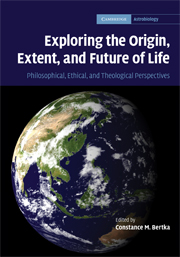 Exploring the Origin, Extent, and Future of Life
Exploring the Origin, Extent, and Future of Life Book contents
- Frontmatter
- Contents
- List of contributors
- Acknowledgements
- 1 Astrobiology in a societal context
- Part I Origin of life
- Part II Extent of life
- 7 A biologist's guide to the solar system
- 8 The quest for habitable worlds and life beyond the solar system
- 9 A historical perspective on the extent and search for life
- 10 The search for extraterrestrial life: epistemology, ethics, and worldviews
- 11 The implications of discovering extraterrestrial life: different searches, different issues
- 12 God, evolution, and astrobiology
- Part III Future of life
- Index
- References
10 - The search for extraterrestrial life: epistemology, ethics, and worldviews
from Part II - Extent of life
Published online by Cambridge University Press: 29 December 2010
- Frontmatter
- Contents
- List of contributors
- Acknowledgements
- 1 Astrobiology in a societal context
- Part I Origin of life
- Part II Extent of life
- 7 A biologist's guide to the solar system
- 8 The quest for habitable worlds and life beyond the solar system
- 9 A historical perspective on the extent and search for life
- 10 The search for extraterrestrial life: epistemology, ethics, and worldviews
- 11 The implications of discovering extraterrestrial life: different searches, different issues
- 12 God, evolution, and astrobiology
- Part III Future of life
- Index
- References
Summary
The search for and discovery of extraterrestrial life, especially an independent origin of life, raise interesting philosophical issues (most or all of which can be connected to important practical issues), in at least three interrelated areas: (1) epistemology, (2) value theory (especially ethics), and (3) worldviews. This chapter samples a variety of views in these areas, touching slightly on some policy and theological connections, both of which are covered more extensively elsewhere in this volume.
The first section will explore epistemological areas such as (a) dealing with the limitation of knowing only one kind of biology, (b) challenges of discerning an independent origin of life, and (c) challenges for assessing the biological status of a region or entire planet. The ethical considerations of the second section will explore (a) the role of an independent origin of life vs. interplanetary transport, (b) ethical views ranging from anthropocentric to cosmological, and (c) potential policy implications. The third section will touch briefly on basic worldviews that revolve around (a) randomness and chance (an “accidental” universe), (b) purpose and meaning (a deliberate universe), and (c) a “bootstrapped” universe in which meaning and purpose emerge in the universe through valuing cultural beings (a “cultural cosmos”).
Epistemology
Extraterrestrial life poses unique challenges to the boundaries, application, and confidence in our knowledge. Some interrelated epistemological questions to consider are: (1) How can we deal with the limitations of knowing only one kind of biology?
- Type
- Chapter
- Information
- Exploring the Origin, Extent, and Future of LifePhilosophical, Ethical and Theological Perspectives, pp. 186 - 204Publisher: Cambridge University PressPrint publication year: 2009
References
- 8
- Cited by
